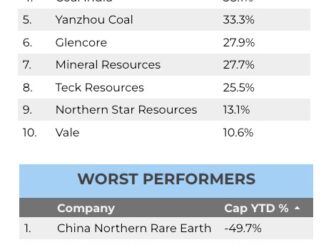
Daily Standup Top Stories
The True Cost of Renewable Energy and the Impact on Consumers’ Electrical Bills
What does the EU, UK and ERCOT have in common? Stu Turley
Climate change supporters and their media try to hit Net Zero by 2050, but at what cost – Doug Sheridan
ENB Pub Note: This article is from Doug Seridan on LinkedIn, and he again hits it out of the park. There is no way the EU, the UK, and Canada can achieve Net Zero by […]
Why Model-Based Oil Forecasts Keep Missing the Mark
ENB Pub Note: This article from Irina Slav on Oilprice.com is spot on. She has an absolutely unique view on energy, and is spot on. We will be covering this on the podcast later. Many […]
EIA expects record U.S. natural gas consumption in 2025
Data source: U.S. Energy Information Administration, Short-Term Energy Outlook (STEO), August 2025 Data values: U.S. Natural Gas Supply, Consumption, and Inventories We forecast natural gas consumption in the United States will increase 1% to set a record of 91.4 billion cubic […]
BlackRock Gas Deal Shores Up Aramco’s Financial Firepower
In a strategic move that underscores Saudi Aramco’s commitment to bolstering its balance sheet while expanding its natural gas operations, the oil giant has inked an $11 billion lease-and-leaseback agreement with a consortium led by […]
Highlights of the Podcast
00:00 – Intro
00:17 – The True Cost of Renewable Energy and the Impact on Consumers’ Electrical Bills
03:11 – Climate change supporters and their media try to hit Net Zero by 2050, but at what cost – Doug Sheridan
04:58 – Why Model-Based Oil Forecasts Keep Missing the Mark
09:39 – EIA expects record U.S. natural gas consumption in 2025
11:26 – BlackRock Gas Deal Shores Up Aramco’s Financial Firepower
13:02 – Outro
Need Power For Your Data Center, Hospital, or Business?
– Get in Contact With The Show –
Video Transcription edited for grammar. We disavow any errors unless they make us look better or smarter.
Stuart Turley: [00:00:00] What is the true cost of renewable energy? But yet more importantly, what is the impact on the consumers and the electrical bills? That on the Energy Newsbeat daily stand-up. [00:00:09][9.0]
Stuart Turley: [00:00:17] The true cost of renewable energy and the impact on consumers’ electrical bills. But what does the EU, UK, and ERCOT all have in common? This is a story out of the energy newsbeat sub-stack. In the global race toward net-zero emissions, renewable energy sources like wind and solar are often touted as the affordable path to a sustainable future. Governments, including those in the EU, the United Kingdom, and the United States, have implemented big ambitions, but retro net zero policies in the EU and UK. Let’s talk about promises versus reality. The targets for 42.5% renewable energy and the overall mix by 2030 and significant reductions in greenhouse gasses ain’t gonna happen. What happens is net zero equals de-industrialization. Just ask Germany, just ask New York, just ask Jersey, California. But here’s where it gets dicey. In this article on Substack, I wrote this part reviewing Dieter Helm’s analysis, systems costs, and the renewables. This was an outstanding article that I went and analyzed it and took summary, Helm argues that while the levelized cost, the LCOE for wind and solar has dropped, this metric ignores broader system costs, intermittent to see the fact that renewables generate only when the wind blows or the sun shines, but yet what he missed was what Meredith Angwin from the author of the grid talked to me about a while ago and I brought up that point. Let’s take ERKONT for an example. ERKonT is about 90 gigawatts that they need in order to supply power on the grid. That 90 gigawatt though they’d have a hundred and eighty gigawatte. Of that hundred and eighty gigawattes they could do with a lot less using the old standard of coal natural gas and nuclear of just adding 20% just in case you had an outage if you needed downtime to repair maintenance but now when you take a look at 100 and 200 percent more power that cost is never calculated into the consumer price front and neither is the land reclamation and that is not being talked about and it was missed in his article that’s why i added it in my article here on this so go to theenergynewsbeat.substack.com and check it out like subscribe and give us a support there. [00:03:10][173.8]
Stuart Turley: [00:03:11] Let’s go to the next story climate change supporters and their media try to hit net zero by 2050 but at what cost? This is from Doug Sheridan on LinkedIn. I highly recommend that you check him out. This is his article. He says, we support more baseload nuclear and natural gas generation and as geothermal and hydro in lieu of coal, solar and wind. Streamline permitting, build more low gas-fired generation to handle daily and seasonal variability while prioritizing reductions in methane emissions that might undermine gas environmental benefits ring out grid inefficiencies. Well said EVs. Should be optional not mandated, so to overload grids or force EVs on those who are not a good fit. Like in the Midwest, if you’ve got to drive 600 miles between your two houses, kind of like somebody I know, you really need to double check and say, hey, wait a minute, maybe an EV is not exactly going to meet that bid. Carbon tax should replace and eliminate all national energy subsidies mandates nations may consider the impact of the carbon tax on trade and competitiveness and explore border adjustments. I disagree on that and I think that there needs to be something in the carbon adjustment border mechanisms are absolutely a graft and a scam. Nobody has done them right in the past and all they do is take that money and give it to their friends companies and then get a kickback. The world is not ready for those kinds of funds. Alright,. [00:04:58][106.9]
Stuart Turley: [00:04:58] Let’s go to the next one. Why is model based oil forecasts keep missing the mark? This is an outstanding story from OilPrice.com Irina Slav. I absolutely love Irina and her sense of humor. Her knowledge is top notch. Let’s go through the three top bullet points and then we’ll go through this story. Many oil price forecasts, particularly those from the international energy agency and net zero organizations consistently predict a glut in ignoring contradictory data or using flawed computer models. Despite these forecasts, global oil demand continues to grow. Prices frequently jump in response to threats on supply indicating a tighter market than models suggest. Listen to this, reliable indicators of oil demand and supply are found in physical market data which often leads to forecasting bodies to reverse their projections and call for more oil investments. I want to give Chris Wright a shout out at the Department of Energy in the EIA in the United States. They have gotten better at not politicizing their data. Unlike the foreign, the international, or the IEA is about as political as you possibly can get. Brent Crude is trading about $67 a barrel and WTI, West Texas Intermediate, is about $65. Not because the world’s consuming less oil than three years ago when crude shot over the $100, oil demand has grown steadily since the 2020 slump caused by the pandemic. The only reason these forecasters, and most notably the IEA, are predicting a glut is because that is what fits their models. And she is spot on. Irina hit it out of the park because that’s what I’ve been saying. We need trillions of dollars just to invest in meeting normal decline curves. That has not been happening. So if we sit back and take a look at whether or not it’s just normal decline curve, that means demand has got to be there. And another major thing is what happens if the Russian sanctions are lifted? If Zelensky can actually understand that he needs to be the big boy in the room, get a new tailor and not from some child’s wardrobe, like he showed up at the White House, and actually end the war, give Russia the Crimea that these Russian bases have been at for a billion years. And then go ahead and then allocate that out there, Zelensky needs to end the war. If Russia ends the war and sanctions are lifted, prices are going to go up because Russia is pretty well maxed out on their EMP company’s ability to increase their production. They’ve been able to avoid sanctions by the use of the dark fleet. They have a ballpark number of 700 tankers and they are quite capable of keeping their oil flowing. However, that being said, they have a limited supply unless American companies could help them out and get going again. And then I think energy as an export as a service would help Secretary Chris Wright be energy dominant by exporting services. But anyway, she brings up some other great points. Last week, prices tanked after the meeting between the presidents of Russia and the United States as I was going in, then the EU and Zelensky took the meeting home and the prospects of peace began to evaporate only to be replaced by the prospect of more sanctions on Moscow. Irina has coined the phrase, sanctions don’t work as intended and they will still mean that Russia will be able to sell all he can produce but he’s been limited in putting money back into production because he’s funding the war so he’s not capable of putting out a lot and flooding the market as people are saying oh Russia’s gonna flood the market not gonna happen anyway outstanding job Irina slav over at oilprice.com also subscribe to Irina Slav on her stack as well too. [00:09:39][280.4]
Stuart Turley: [00:09:39] IEA, the next story, the IEAs expects record U.S. Natural gas consumption in 2025. This is from Chris Wright. Speaking of Chris Wright and the Department of Energy, I really like their reports because they have been spot on since he’s gotten in there and he’s really trying to hit it out. Listen to this. Natural gas consumption was high in the beginning of the year driving our forecast. January consumption was a record 126.8 BCF than five percent in the record set in January 2024. Holy smokes, Batman! They estimate that the U.S. Natural gas consumption decrease this spring and summer compared to consumption over the same time last year in the power sector, but that is going to be picked back up as more demand is rolling through. [00:10:28][48.9]
[00:10:29] Let’s go through this last story here. Before I do that, I want to give a shout out to Reese Energy Consulting. Please go to ReeseEnergyConsulting.com and check them out. If you’re in the midstream space, if you’re the natural gas base and you want to get your to Poland to Germany if you want to get them and export them make sure you get paid for every single molecule if you’re in AI and you’re a data center and you need natural gas get a hold of Reese Energy Consulting also go to investinoil.energynewsbeat.co and check out our dot-com and check out and if you are got a tax burden if you in New York New Jersey California and you’re a little worried about taxes give us a calculator there for you and say hey wait a minute I need to reduce my taxes and tax burden and check that out. It’s a pretty cool little tool. [00:11:26][57.4]
[00:11:26] Let’s go to the last story here for the day. Blackrock gas deal shores up Aramco’s financial firepower. This is a pretty good story and a strategic move. Saudi Aramcos commitment to bolstering its balance sheet while expanding natural gas operations that oil giant has inked Listen to this, a billion dollar lease and lease back agreement with BlackRock Global Infrastructure Partners, GIMP. If it was me, it’d probably be called GIMPs. But it’s called GIP, G-I-P, Global Infrastructure Partners. This deal announced on August 14th, 2025, involves the Jevara. Gas processing facilities and is poised to inject significant capital into Aramco’s coffers. And it’s because they still owe a lot of money to the sovereign wealth fund. And this is one way for them, Michael and I have talked about this on the show, that if this is a way for them to actually fund a lot that and yet get it in there and be financially fiscally responsible. So hats off to Saudi Aramco. And again, that’s the difference between having oil and gas as a general rule in the United States and in Saudi Arabia are giving back to their investors. Not like the wind, solar, and hydrogen. I wrote that story about that just recently as well. If you want money, take a look at going into oil and gas and do it responsibly. [00:13:01][94.8]
Stuart Turley: [00:13:02] Anyway, with that, like, subscribe, go to TheEnergyNewsBeat.substack.com or go to energynewsbeat.co or energynewsebeat.com. Look forward to hearing from you all soon. Have an absolutely wonderful day! [00:13:02][0.0][771.3]






